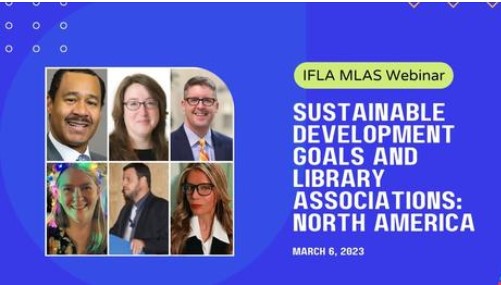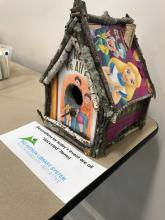
A big thank you to the Maryland and Delaware Library Associations for the invitation to keynote their 2024 joint conference. Their theme was right up my alley!


Very grateful to Sandy Hirsh who edited this book, Libraries 2035: Imagining the Next Generation of Libraries. Sandy invited me to write this chapter and it was a fun exercise. Sandy and I also recorded a little webcast about the chapter if you’re interested.
Here’s a very happy Sandy!


shown above (l-r): Matthew Bollerman, RSA, Roger Reyes, Jennifer Ferris, Lisa Krop, and Alex Blend
We made it to LibLearnX in Baltimore! The Sustainable Libraries Initiative Team was in full effect at the conference with a booth and a pre-conference. It was awesome to meet so many folks who already knew about the SLI and were hungry to learn more!
Well, now that was something else. Huge thank you to the folks at WebJunction (shout out to JP and Steph! You two are THE BEST!) for the phenomenal opportunity to produce a six-part webinar series with accompanying articles and resources: Sustainable Libraries: Resources and webinars for climate action

Six may have been overkill on my part, it was A LOT of work, but boy was it fun. The guest speakers in some of the webinars are just stellar, I still can’t believe they all said “yes!” when I invited them!
Mandi Goodsett, Performing Arts & Humanities Librarian / OER & Copyright Advisor, Cleveland State University (OH), ALA Sustainability Roundtable Coordinator, and co-author, “Sustainable Event Planning for Libraries and Library Organizations” in Libraries & Sustainability: Programs and Practices for Community Impact
Evan Meszaros, Research & Engagement Librarian, Case Western Reserve University (OH), ALA Sustainability Round Table and ACRL Science & Technology Section, and co-author, “Sustainable Event Planning for Libraries and Library Organizations” in Libraries & Sustainability: Programs and Practices for Community Impact
Hazel Onsrud, Adult Services Librarian, Curtis Memorial Library (ME)
Jenny Garmon, Civic Engagement Specialist, Kansas City Public Library (MO)
Gabrielle Griffis, Assistant Youth Services Librarian, Brewster Ladies’ Library & Blue Marble Librarian (MA)
M’Balu “Lu” Bangura, Chief of Equity and Fair Practice at the Enoch Pratt Free Library & Maryland State Library Resource Center
*Webinars in the series:
Sustainability 101
Recording now available
Climate Action Planning (Part 1): An Introduction
Recording now available
Climate Action Planning (Part 2): Disaster Preparedness and Community Resilience
Recording now available
Climate Justice
Recording now available
Living Our Values Out Loud: Programs that Walk the Talk
Recording now available
Stronger Together: Collective Impact and Climate Action Programming
Recording now available
*Series articles
Getting Started with Climate Action Planning
I could not be more honored to be invited in to speak at OCLC’s Distinguished Seminar Series this year. OCLC’s reach and impact on our profession is nothing short of profound. The audience they command is pretty intimidating but what an amazing opportunity!

You can check out the recording here as well as the viewing guide that goes along with it.
Here is the link to the recording of the webinar “Sustainable Development Goals and Library Associations: North America.”
https://www.youtube.com/watch?v=LjCFntgIDHw

This is the first event from a webinar series featuring different regions of the world presented by IFLA’s Management of Library Associations Section (MLAS) in collaboration with the New Professionals Special Interest Group (NPSIG), the Environment, Sustainability and Libraries Section (ENSULIB), and the IFLA Regional Divisions.

That time we got to share the stage with Bill McKibben and he talked about LIBRARIES! “I think connecting libraries as community hubs for public access is a good idea, and highly relevant. These communities may not be contributing huge amounts of carbon, but they are the places where it’s growing fastest–and more to the point they’re the ones where people are most suffering the effects.” – Bill McKibben https://www.youtube.com/watch?v=_OTuBawEfE8

I’m delighted to be the lead instructor for the first-ever eCourse from the American Library Association on Sustainability. Thanks to a partnership between ALA and the Sustainable Libraries Initiative (SLI), students will have access to a four-week course on the new core value of sustainability.
Course Description:
Climate change and environmental destruction are a code red for humanity and are this generation’s grandest challenge. In 2019, ALA Council added “Sustainability” as a core value of the profession, adopting the triple bottom line definition of sustainability to ensure balanced decision-making that respects environmental stewardship, social equity, and economic feasibility. As community leaders and facilitators, libraries should be modeling sustainable practices among their staff and within their facilities.
In this special eCourse, Rebekkah Smith Aldrich, President of the Sustainable Libraries Initiative, will lead you through the principles and practices of sustainable librarianship along with a group of expert speakers, lecturers and writers.
Our ability to pull together as neighbors and adapt in the face of what is already happening while lessening the severity of the impacts for future generations will require us to think differently, to adopt a new mindset, and to consider decisions—large and small—through the lens of sustainability. Libraries of all types are perfectly positioned to help with and to lead in this work. We must step up in this moment and find ways to lead by example and inspire those we serve with and for to do the same.
After participating in this course:
There are 25 free seats in the eCourse for members of the Sustainable Libraries Initiative. All others can register through this link.
Sustainable Library Certification Awarded to the Mid-Hudson Library System (NY)

The Sustainable Libraries Initiative has announced that my very own Mid-Hudson Library System (MHLS) has been certified through the Sustainable Library Certification Program.
As part of our certification process, MHLS developed policies that explicitly state the importance of considering triple bottom line sustainability in decision-making at all levels of the organization. We have made efforts to reduce waste by exclusively using reusable cups, dishes, and cutlery in their staff areas and conference rooms. We started composting food waste on-site and recently installed EV chargers in our parking lot. We regularly highlight member libraries who demonstrate programs or events that focus on environmental stewardship in their newsletter. To decorate for a recent event, the staff upcycled discarded books into pumpkin centerpieces to adorn the tables, created birdhouses out of children’s book covers (pictured), and made trees out of old magazines.

MHLS has continued to find new and innovative ways to expand library services, create new partnerships, and find new ways to inform and empower their member libraries and communities. Their Library of Local project was formed in partnership with Partners for Climate Action Hudson Valley to assist community members in taking action on the climate crisis. This project includes a lending library and programming developed around a yearly theme. Fifteen MHLS libraries were selected to participate, providing a network of climate resilience resources in communities throughout their service area.
See the highlights in the Sustainable Libraries Initiative’s November 2022 Newsletter, Press Release, and our Certification Presentation.